Focus on Faculty
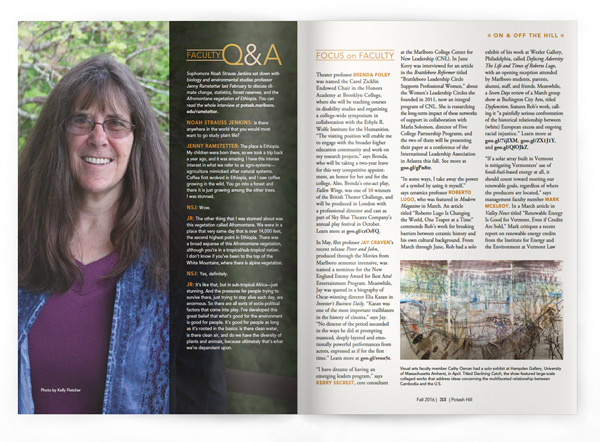
Faculty Q&A
Sophomore Noah Strauss Jenkins sat down with biology and environmental studies professor Jenny Ramstetter last February to discuss climate change, statistics, forest reserves, and the Afromontane vegetation of Ethiopia. You can read the whole interview.
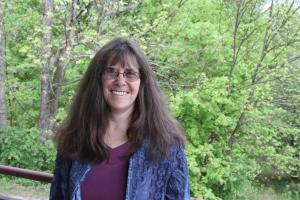 Noah Stauss Jenkins: Is there anywhere in the world that you would most want to go study plant life?
Noah Stauss Jenkins: Is there anywhere in the world that you would most want to go study plant life?
Jenny Ramstetter: The place is Ethiopia. My children were born there, so we took a trip back a year ago, and it was amazing. I have this intense interest in what we refer to as agro-systems— agriculture mimicked after natural systems. Coffee first evolved in Ethiopia, and I saw coffee growing in the wild. You go into a forest and there it is just growing among the other trees. I was stunned.
NSJ: Wow.
JR: The other thing that I was stunned about was this vegetation called Afromontane. We were in a place that very same day that is over 14,000 feet, the second highest point in Ethiopia. There was a broad expanse of this Afromontane vegetation, although you’re in a tropical/sub-tropical nation. I don’t know if you’ve been to the top of the White Mountains, where there is alpine vegetation.
NSJ: Yes, definitely.
JR: It’s like that, but in sub-tropical Africa—just stunning. And the pressures for people trying to survive there, just trying to stay alive each day, are enormous. So there are all sorts of socio-political factors that come into play. I’ve developed this great belief that what’s good for the environment is good for people. It’s good for people as long as it’s rooted in the basics: is there clean water, is there clean air, and do we have the diversity of plants and animals, because ultimately that’s what we’re dependent upon.
Focus on Faculty
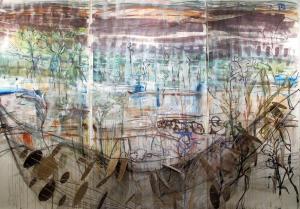
Theater professor Brenda Foley was named the Carol Zicklin Endowed Chair in the Honors Academy at Brooklyn College, where she will be teaching courses in disability studies and organizing a college-wide symposium in collaboration with the Ethyle R. Wolfe Institute for the Humanities. “The visiting position will enable me to engage with the broader higher education community and work on my research projects,” says Brenda, who will be taking a two-year leave for this very competitive appointment, an honor for her and for the college. Also, Brenda’s one-act play Fallen Wings was one of 10 winners of the British Theater Challenge, and will be produced in London with a professional director and cast as part of Sky Blue Theatre Company’s annual play festival in October. Learn more.
In May, film professor Jay Craven‘s recent release Peter and John, produced through the Movies from Marlboro semester intensive, was named a nominee for the New England Emmy Award for Best Arts/ Entertainment Program. Meanwhile, Jay was quoted in a biography of Oscar-winning director Elia Kazan in Investor’s Business Daily. “Kazan was one of the most important trailblazers in the history of cinema,” says Jay. “No director of the period succeeded in the ways he did at prompting nuanced, deeply layered and emotionally powerful performances from actors, expressed as if for the first time.” Learn more.
“I have dreams of having an emerging leaders program,” says Kerry Secrest, core consultant at the Marlboro College Center for New Leadership (CNL). In June Kerry was interviewed for an article in the Brattleboro Reformer titled “Brattleboro Leadership Circle Supports Professional Women,” about the Women’s Leadership Circles she founded in 2011, now an integral program of CNL. She is researching the long-term impact of these networks of support in collaboration with Marla Solomon, director of Five College Partnership Programs, and the two of them will be presenting their paper at a conference of the International Leadership Association in Atlanta this fall. Learn more.
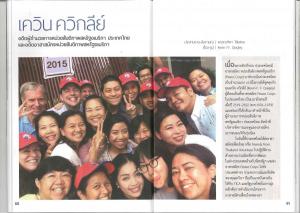
“In some ways, I take away the power of a symbol by using it myself,” says ceramics professor Roberto Lugo, who was featured in Modern Magazine in March. An article titled “Roberto Lugo Is Changing the World, One Teapot at a Time” commends Rob’s work for breaking barriers between ceramic history and his own cultural background. From March through June, Rob had a solo exhibit of his work at Wexler Gallery, Philadelphia, called Defacing Adversity: The Life and Times of Roberto Lugo, with an opening reception attended by Marlboro students, parents, alumni, staff, and friends. Meanwhile, a Seven Days review of a March group show at Burlington City Arts, titled Dysfunction, features Rob’s work, calling it “a painfully serious confrontation of the historical relationship between (white) European excess and ongoing racial injustice.” Learn more, and more, and more.
“If a solar array built in Vermont is mitigating Vermonters’ use of fossil-fuel-based energy at all, it should count toward meeting our renewable goals, regardless of where the producers are located,” says management faculty member Mark McElroy. In a March article in Valley News titled “Renewable Energy Is Good for Vermont, Even if Credits Are Sold,” Mark critiques a recent report on renewable energy credits from the Institute for Energy and the Environment at Vermont Law School. He suggests redefining the boundaries of our state energy policy to include all of the energy producers we buy from, so that renewable energy credits sold to them can be accounted for. Learn more.
“Our intention was to unpack and understand what social justice looks like not only from an outward perspective—what we’re trying to do—but also inwardly: what we’re trying to be, as conscious companies,” say management faculty members Claire Wheeler and Lori Hanau. In an article in the March/April issue of Conscious Company Magazine titled “Is Employee Ownership a Right or a Privilege?”, Claire and Lori interview social entrepreneur Jerry Gorde about social justice, shared leadership, and employee stock ownership plans. Together they explore what is needed to shift the paradigm of business if employee ownership is truly a right rather than a privilege. Learn more.

Spanish language and literature professor Rosario de Swanson published an article on Judith, a dramatic adaptation of the biblical heroine by Mexican feminist Rosario Castellanos, in the prestigious journal Revista Iberoamericana (Vol. LXXXII, Núm. 254, Enero-Marzo 2016). She also travelled to San Miguel de Allende, Mexico, in May to participate in a workshop with the amazing Guillermo Gómez-Peña, a MacArthur genius grant performance and theater artist, author, and creator of the conceptual institute for hybrid art called La Pocha Nostra. And as if she is not busy enough, Rosario was appointed to serve on Vermont’s advisory committee to the U.S. Commission on Civil Rights, making recommendations on statewide and local civil rights issues, from racial profiling to housing discrimination. Learn more.
In April, Marlboro College’s Center for Creative Solutions (CSS) hosted a two-day community discussion and brainstorming session on the future of public education in Vermont in response to Act 46. “We wanted to promote a community conversation to grapple with issues of equity and excellence through an open, facilitated process,” said art history professor Felicity Ratté, director of CSS. Additionally, Felicity presented her Capstone for an MS in Management at the grad school in March. According to Felicity, her work was “a study of the soft skills and practices that lead to productive, civil, civic engagement with the aim of creating a curriculum for a civic engagement training for multi-generational students.” Learn more.
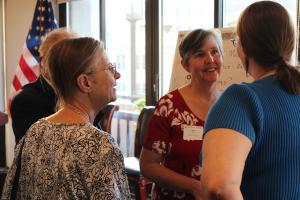
“What is happiness? Can it be measured? And what is the relationship between happiness and virtue, money, pleasure, relationships, mindfulness, and satisfaction?” Philosophy professor William Edelglass entertained these questions in an April community lecture titled “The Genealogy of Happiness: From Aristotle to Positive Psychology,” at the Marlboro Elementary School. Beginning with an overview of different conceptions of happiness in Western philosophy, religion, and political theory, William discussed the claims of “the new science of happiness” and the findings of positive psychology in the context of the history of the idea of happiness.
“52 Questions for a Better Friendship gives you those fun questions you are always looking for on a long car ride, sitting in the living room, or taking a hike with your friend,” says Travis Hellstrom, co-chair of the management programs at the grad school. He has authored and self-published two 52 Questions so far, focused on friendship and relationship, but reports the series will be picked up by Hatherleigh Press and Random House in 2017 and expanded to include others. He also recently published The Dalai Lama Book of Quotes. Learn more.
In April, politics professor Meg Mott gave a workshop at the grad school about writing opinion pieces, titled “Getting Your Words to Count,” as part of the Management Ideas Exchange (MIX) workshop series. Meanwhile, Meg was quoted in an article picked up in May by several media outlets in southern California, titled “A Fashion ‘Do’ for 2016: The ‘I Voted’ Sticker.” According to Meg, even voters who have reasons to believe the system is rigged value the star-spangled stickers. “It’s as if the presence of all those stickers will restore . . . democratic decision-making to the voting public, sustaining the illusion that the majority, not the party elites, ultimately decide.” Learn more.
Management program faculty member Debra Askanase presented a session on collaborative training models at the Nonprofit Technology Conference, hosted by the Nonprofit Technology Network (NTEN), in March. It was so well received that NTEN asked Debra and her collaborators to write an article about the topic for their monthly newsletter. Titled “The Future of Capacity-Building Is Collaborative,” the article defines collaborative learning and provides steps for creating a collaborative learning environment, using the grad school’s management faculty as a practical example. Learn more.
